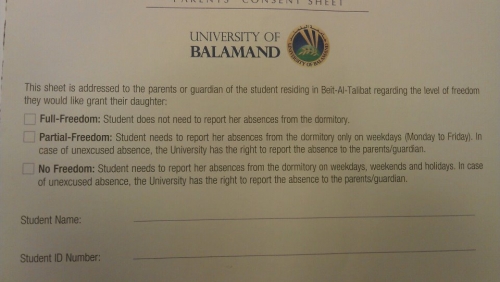
Sometimes it takes a collective of feminists to spot the patriarchal elephant in the room (and to show it to the door).
Battling patriarchy is difficult, particularly when you try to do it alone. If anything was learned from the Jan 14 March, solidarity is both empowering and inspiring. Change will only come if we work together to identify problems and construct positive solutions.
On Thursday 19 January 2012, Nasawiya member Sarah Abou Raad posted an image. It was of the ‘Parental Consent Sheet’ for the Beit el-Taibat (women’s dorms) at the University of Balamand. On this form the parent’s were asked what ‘level of freedom they would like to grant their daughter’. The options were ‘Full Freedom’, ‘Partial Freedom’, or ‘No Freedom’. Outraged, Sarah posted an image of the form with the caption ‘That’s how education is supposed to free our minds!! Im indignant!! I cant believe it!!’
Roughly an hour later, another Nasawiya member, Christine Lindner, saw Sarah’s post. Being an Assistant Professor at the University of Balamand, Christine was immediately frustrated by the image that she saw. During the past few months, Christine, with the help of many dedicated students, has helped start the debate about gender discrimination on campus. Farah from the Adventures of Salwa led a great discussion, while the student newspaper covered a number of important topics related to sexual harassment. Christine met with the Dean of Students to revise sexual harassment policies and felt a general interest for change. However, this form, it is language of ‘no freedom’ for female students was a huge step in the wrong direction.
An interesting exchange took place between Sarah and Christine that night, over the implications of the application and its wording. As a result, Christine sent an email to the Dean of Student Affairs asking questions about the application, which she posted to the Nasawiya wall. Other members posted responses to the image’s comment thread. Some mentioned that similar forms are used at dorms for other universities. This needs to be researched further and pursued for change.
Christine met with the Dean of Student Affairs and the university counselor on Monday 23 January 2012. Both positively received the complaint, stating that it was only when Christine had identified the strong language of the form that they realized how counterproductive it was to their goals of empowering the students. As such, a replacement form was created emphasizing not the disempowerment of the female students, but the level of supervision that the university would play, upon the request of the parents (many of whom live abroad). It was also agreed that this form would be signed by the parents of students resident at both the women’s and men’s dorms. The updated version can be found at
http://www.balamand.edu.lb/english/OSA.asp?id=2705&fid=160
So while this does not mark the erasure of patriarchy at the University of Balamand, it does mark a small victory, while illuminating a few important lessons:
Firstly, a variety of tactics are needed to bring down patriarchal systems. At times, large protest marches are needed. In other times, it is a stern email from a member of faculty asking questions about a problematic practice. Others, it is the threat of images going viral on the internet. Sometimes, all three. Patriarchy and social injustice manifest themselves in all facets of life. We need to keep all tools ready, harnessing the appropriate tool for the specific situation and specific audience.
Secondly, identifying and challenging patriarchy is a collective effort. Sarah’s posting of the image prompted Christine to write the letter, which illuminated the problem to the Dean, so that the form was changed and the discriminatory practice equalized. This is the collective at work. This is its strength. This is why it works. We cannot stand alone, for the elephant is too big sometimes to even see, let alone push out the door. And if one project fails, we are there to catch each other, provide an umbrella when it rains, or a tissue for the tears. This is the strength of the collective and this is why it will succeed.
Nasawiya (North)
This first appeared here at Sawt Al Niswa (Voice of the Women). Thanks to Sawt Al Niswa.
(Photo Credit: Sawt al’ Niswa)